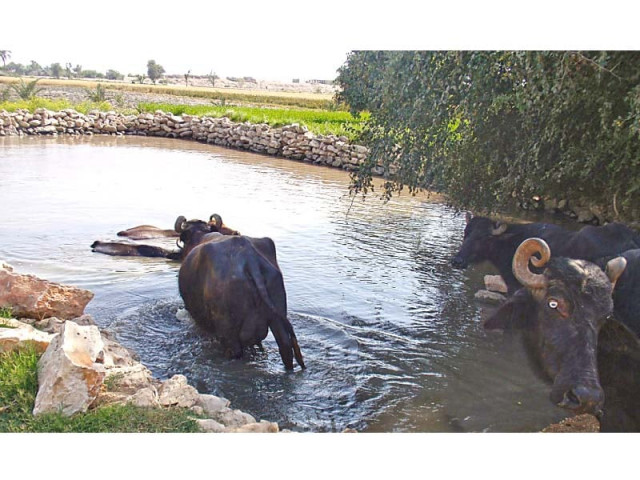Land owner installs biogas plant after village is denied gas
Learned technique from Faisalabad and had local mason’s help to create the machine

Chaudhry Akhtar set up his own biogas plant 12 years ago after being denied access to a regular gas connection due to political influence. PHOTO: EXPRESS
Necessity is the mother of all inventions, and if Chaudhry Akhtar, a land owner from a village named after him near Arore, had not been denied a gas connection 12 years ago, he would not have created a biogas plant to fuel his house.
"I tried to get a gas connection for my village 12 years ago when natural gas was supplied to some villages nearby but it was denied due to political influence," Akhtar, 75, told The Express Tribune. Akhtar's village is located near Islamabad Takri in Arore union council, some 20 kilometres away from Sukkur city. "Since I often visit Faisalabad, where biogas plants are quite common, I copied the design and came back to start working on it with the help of a mason."
Karachi's garbage is a resource — not kachra!
The machine cost Akhtar around Rs45,000 at that time and he estimate that the cost must have doubled by now. The main tank is spread over 12 square-feet and covered with a concrete round block, with half-an-inch diameter pipe fixed in the middle. There is a six-inch-diameter pipe that pours dung into the tank. The concrete block serves as a cover to avoid gas leakage, he explained. "The only thing I have to do is pour around 10 kilogrammes of dung in the tank, which is quite sufficient to produce gas for 24 hours," he explained, adding that the plant runs sugarcane crushing and wheat grinding machines. "By installing the biogas plant, I am not only getting gas for domestic use but also able to run generator in case of power failure," said Akhtar, visibly proud of his achievement.

Learned technique from Faisalabad and had local mason’s help to create the machine
Sometimes the gas pressure increases in the tank and, to keep it safe, an outlet has been built through which used dung overflows into another concrete tank, he added. This used dung serves as a very good fertiliser for the land, he pointed out. Akhtar is a proud owner of a large tract of agriculture land, around 35 buffaloes, five cows, dozens of goats and chickens.
K-P gas theft causing annual loss of Rs8 billion, claims Abbasi
Akhtar advises other land owners in the vicinity to also switch over to biogas plants, especially if they have buffaloes on their land. "Our forests are shrinking due to merciless cutting of trees used for burning wood," he pointed out, adding that vanishing forests and rampant use of natural gas, electricity and petroleum products are the key factors behind climate change. "At least in the rural areas where people often have buffaloes and cows, biogas plants can easily be installed to save the forests," he suggested.
Waste not, want not
Akhtar's ideas are endorsed by the Environment Protection Agency, whose director, Waqar Hussain Phulpoto, said animal waste is a good source of renewable energy, making biogas plants very eco-friendly. The plants are very beneficial for people living in rural areas as most of them have around 10 buffaloes or cows, he told The Express Tribune.
"Cow dung contains methane, which if released in the air, can add to pollution," he said. "The same dung can be mixed with water and then added to the tank to produce biogas."
Even after the dung has been used to produce gas, the remaining waste can serve as organic manure for the agriculture land, he pointed out. Emission of methane gas in the air is adding to global warming, therefore, its use in biogas plants minimises these hazards, he said.
Phulpoto suggested setting up larger bio-gas plants in cattle colonies, such as the ones in Karachi and Sukkur. These plants will not only be able to produce gas for domestic and commercial use but the remaining waste can be used in agricultural fields.
Published in The Express Tribune, May 5th, 2016.



















COMMENTS
Comments are moderated and generally will be posted if they are on-topic and not abusive.
For more information, please see our Comments FAQ